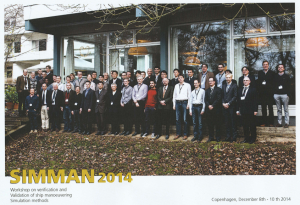For those interested there will be a Southern Joint Branch RINA/IMarEST meeting on the 4th March at 14:00 for 14:30 by Alasdair Green, of ACLiveLine. Registration is advised more info on file attached AmericasCup (3)
Lecture Theatre A, Physics Building (Building No. 46), Highfield Campus, Southampton, SO17 1BJ
All posts by Stephen Turnock
Ship Science Group Design Projects
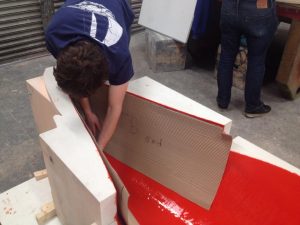 Our finalists are hard at work on their group design projects. These projects, worth a third of their marks in the final year are the culmination of the MEng degree programmes. This year the results of all the projects will be on display in our Faculty’s first end of year design show on the 12th June. If you would like an invite please contact us for further details. As the projects start coming to completion we will be posting information at to their achievements.
Our finalists are hard at work on their group design projects. These projects, worth a third of their marks in the final year are the culmination of the MEng degree programmes. This year the results of all the projects will be on display in our Faculty’s first end of year design show on the 12th June. If you would like an invite please contact us for further details. As the projects start coming to completion we will be posting information at to their achievements.
One GDP project this year – Team Fortitude are building an autonomous surface vessel with the capability of crossing the Atlantic. Such vessels will become ever more common and provide some exciting applied naval architecture and marine engineering challenges as well as enhancing our Maritime Robotics interests as we look into the challenge of increased use of autonomous systems in Maritime Shipping.
Predicting the performance of uncertain systems with application to vibro-acoustics and electromagnetics
Prof Robin Langley will be speaking this Thursday 12th at 2pm in room 2013 in building 176. All welcome.
This talk will review computational methods for the analysis of built-up systems that have very many degrees of freedom, and which have uncertain or random properties. The aim is to predict not only the nominal performance of the system, but also the statistical distribution of the performance over an ensemble of random systems. A key element of the talk will be Statistical Energy Analysis (SEA), a technique that was championed at Southampton for many years by researchers such as Fahy, Lalor, Pinnington, Keane, Price, and Mace. Various extensions to this approach will be discussed including: the inclusion of non-parametric statistics and variance prediction, the coupling of SEA to the finite element method, the analysis of the combined effect of parametric and non-parametric uncertainty, and the prediction of performance limits.
Various industrial examples will illustrate the application of the method to aeronautical and automotive systems, and to electromagnetic compatibility (where the concern is with electromagnetic waves and Maxwell’s equations).
Biography
Robin Langley is Professor of Mechanical Engineering and Head of the Division of Mechanics, Materials and Design, in the Cambridge University Engineering Department. He has previously held academic positions at Cranfield and Southampton (Department of Aeronautics and Astronautics, 1991-1998), and he acts as a consultant to industry: previously with ESI on the development of the software package VA One, and most recently with Wavesix LLC on vibro-acoustics and electromagnetics.
Challenges and Developments in Maritime Safety and Security Assessment
Thursday 5th Feb 2015, Room 1025 B175 (entrance via B176)
We are very pleased to invite Professor Jin Wang, Director of Liverpool Logistics, Offshore and Marine (LOOM) Research Institute at Liverpool John Moores University will deliver an invited seminar.
Abstract
Safety and security assessment has been increasingly used to support maritime system design and operation. There has also been a growing international recognition that security issues of maritime systems need to be reviewed. This presentation will address major challenges and developments in maritime safety and security assessment. In particular, areas covered include regulatory regimes in maritime safety and security, IMO’s formal safety assessment, sea port security modelling, and piracy related ship operations together with case studies. Some advanced techniques for maritime safety and security assessment are outlined to demonstrate their potential application.
Biography
Jin Wang is Professor of Marine Technology and Director of Liverpool Logistics, Offshore and Marine (LOOM) Research Institute at Liverpool John Moores University (LJMU), UK. Following just less than 5 years’ research as a research associate at Newcastle University, he joined LJMU as a lecturer in 1995, and was promoted as Reader in Marine Engineering and Professor of Marine Technology in 1999 and 2002 respectively. He has been involved in maritime safety and security for the past 25 years. His extensive publications include 2 research monographs and more than 100 SCI cited journal papers relating to maritime safety and security. He has completed supervision of more than 40 doctoral/postdoctoral researchers in the fields of maritime safety and security.
Rails on track
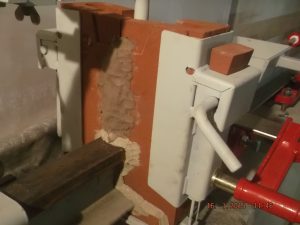

For those interested in materials and process technology – see images of the welding process for the towing tank rail installation process currently on-going in the new laboratory 5 of building 185. Contractors RapidRail have developed a process that should minimise heat distortion and allows us to achieve an eventual rail alignment tolerance of 0.1mm.
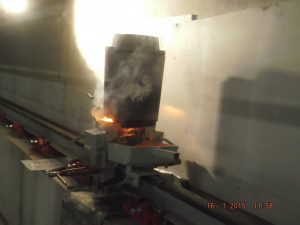
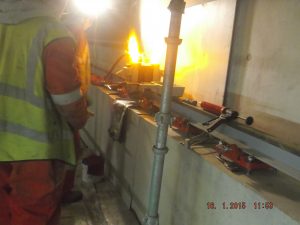
Slamming Catamarans and Surfing Prawns 15th Jan 175/1025 12noon
Professor Giles Thomas, BMT Chair of Maritime Engineering at University College London will present on “Slamming Catamarans and Surfing Prawns” in the beginning of new year.
Date: Thursday, 15/1/2015 Room: Boldrewood campus B175 Seminar Room 1025 Time: 12:00-13:00
High-speed catamarans have been the cornerstone of the Australian ship design and building industry over recent decades. Though there have been several major research challenges to ensure they have maintained their global edge. One of these challenges has been the ability to design vessels to operate in extreme wave conditions, at high speed whilst maximising payload – this has needed significant insight into the wave loads experienced by such craft and in particular slamming characteristics. This talk will outline the approach taken by a team in Tasmania to solve these issues and some key findings.
Also to bring some sunshine to the wintry UK, two other Australian summertime-focused projects will be introduced: surfing wave pools and fish bycatch reduction.
Biography
Giles Thomas was recently appointed to the BMT Chair of Maritime Engineering at University College London. Previously he was Professor and Director of the National Centre for Maritime Engineering and Hydrodynamics at the Australian Maritime College, an institute of the University of Tasmania – responsible for the maritime engineering academic programmes, research activities and suite of research facilities. He has over 24 years of research and development experience in the fields of hydrodynamics and fluid-structure interaction working with a large range of industry partners including the Defence Science and Technology Organisation, Incat, Woodside, Austal Ships, Tenix, Clough, Intecsea and Webber Wave Pools.
‘Marine Global Trends 2030’ Thursday 22 January 2015 | 12.30 B175/1025
Ivy Fang, Lloyd’s Register will present the following seminar
Synopsis: In 2030, we could be living in a world where China owns a quarter of the merchant fleet, almost half of offshore oil is extracted from the deepest waters, there are 100 times as many offshore wind platforms, the size of the tanker fleet is expanding slower than all other major ship types and the number of containerships with capacities that exceed 7,600 TEU is growing three times faster than those below that threshold. Despite the volatile nature of commercial shipping, 2030 could well usher in an era during which the prevailing trends and themes are opportunity and growth. Our industries may still be prone to commercial and political cycles where unexpected shocks can destroy profits, disrupt supply chains and upend business models. But The Global Marine Trends 2030 report offers a positive vision of 2030 for the marine industries, with real opportunities for business, investors, employees and stakeholders.
Come and Listen to Miss Ivy Fang talk about Marine Scenarios to 2030, discuss and debate if you share her cautious optimism for the future.
All are welcome to attend and please feel free to circulate to the wider community.
Great performance by Southampton Engineering in REF2014
It was great to hear just before Christmas that both the quality and quantity of our Faculty’s engineering research was recognised in the results of the seven year long REF2014 process, . Our unit of assessment (General Engineering UoA15 ) beating Cambridge into 1st place on the power rating (eg product of our number of researchers 192 submitted and our grade point average (GPA) of 3.23 out of 4 , where 4 is for world class research). We are also in the top 5 when our GPA is weighted by the proportion of researchers submitted – Southampton submitted 100% of its engineering academics.
FSI played its part in this excellent outcome supplying many strong papers with its 16 staff eligible in 2013 submitted. Our work in performance sport was one of the many strong impact case studies submitted along with our many PhD successes during the assessment period.
£7.5M Managing Energy on Marine Vessels
Following on from the two recent InnovateUk funded programmes on vessel efficiency is the 3rd call. We are well placed to participate in many of these areas and are looking to widen our base of industrial partners through this process.
The registration process is open from 12th jan and full details can be found via the innovateuk website
Simman 2014
Joe Banks and Charles Badoe represented FSI at the 2014 SIMMAN workshop http://www.simman2014.dk/ held in Lyngby Denmark on 8-10 December. This workshop series is aimed at benchmarking the prediction capabilities of different ship manoeuvring simulation methods including systems and CFD based methods through comparison with results for container ship, tanker and surface combatant hull form test cases.
This year’s workshop is following up on the workshop held in 2008, which was the outgrowth of discussions and planning conducted by the 24th and 25th ITTC manoeuvring Committees. CFD based methods were compared with both PMM/CMT and free-model test data. Comparisons for PMM/CMT and free model tests were blind in the sense that the PMM/CMT and free-model test data was not provided prior to the workshop unless data was required as input to the simulation method.
The workshop was organised by FORCE, MARIN and IIHR with assistance and support from the 27th ITTC manoeuvring Committee. Participants of the workshop included, BAE Systems, CNR-INSEAN, ECN/CNRS, Force Technology, Hamburg University of Technology, HSVA, Hyundai Heavy Industries Co. Ltd, Indian Institute of Technology, KAIST, KRISO, MARIN, NMRI, ONR, OSK-Ship Tech, Shanghai Jiao Tong University, Technical University of Berlin, University of Genoa, University of Iowa, University of Michigan, University of Southampton, Wiki Ltd and University of Zagreb and Wuhan University of Technology.
University of Southampton submitted a paper entitled ‘Comparison of various approaches to numerical simulation of ship resistance and propulsion’ by Badoe, C., Winden, B., Lidtke, A.K., Phillips, A.B., Hudson, D.A. and Turnock S.R. The full paper can be found at http://eprints.soton.ac.uk/369875/.
